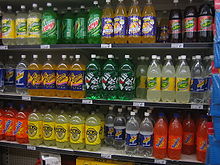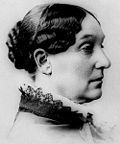- Oregon Bottle Bill
-
The Oregon Bottle Bill is container-deposit legislation passed in the U.S. state of Oregon in 1971 and amended in 2007. It requires cans, bottles, and other containers of carbonated soft drink, beer, and (since 2009) water sold in Oregon to be returnable with a minimum refund value. It is administered and enforced by the Oregon Liquor Control Commission.[1]
The law is credited with reducing litter and increasing container recycling. As a result, items which used to make up around 40% of roadside litter now represent about 6%. With return rates averaging 90%,[2] another major benefit is in waste reduction and resource conservation, particularly for aluminum. By comparison, states without similar bills recycle on average 28% of their containers.[citation needed] Beverage distributors retain all deposits not reclaimed by consumers.
Oregon's 1971 bill was the first such legislation passed in the United States.[3]
Contents
Context
States first enacting
a Bottle Bill[4]year state 1971 Oregon 1972 Vermont 1976 Maine 1976 Michigan 1978 Connecticut 1978 Iowa 1982 Massachusetts 1982 New York 1982 Delaware 1986 California 2002 Hawaii Deposits on refillable glass bottles were the norm well before the 1930s, at which time the disposable steel beverage can began to slowly displace glass. By 1960, almost half of U.S. beer was in cans, while only five percent of soft drinks were not in bottles.[5]
Vermont passed the first "bottle bill" in 1953, but it only banned non-refillable bottles and did not introduce a deposit system. It expired in 1957 after beer industry lobbying.[5]
British Columbia enacted North America's oldest beverage deposit system in 1970.[6]
Beverage containers constitute as much as 58% of litter.[7] States which have adopted bottle deposits have reduced litter as much as 64%.[8] The container deposit system cost averages 1.53 cents per container (versus 1.25 cents for other collection systems) are more than two and a half times more effective at recycling containers.[9]
Oregon's bottle bill inspired similar laws in eight other states between 1972 and 1983. California activists attempted to pass a bottle bill beginning in late 1970s but were blocked by recycling organizations. A modified bill passed in 1986.[10] In 1991, Germany enacted an entirely different method which taxes manufacturers on the basis of the amount of packaging.[11]
By 1968, beer and soda companies were responsible for 173 million bottles and 263 million cans each year in Oregon.[12]
History
Richard Chambers, a logging equipment salesman,[13] collected litter during his hiking, climbing, and kayaking throughout the state. In 1968 he called Oregon State Representative Paul Hanneman, whom Chambers knew well, after he was inspired by a small newspaper article about British Columbia wanting to ban non-refundable bottles and cans. Chambers wanted a deposit on bottles and cans to encourage people to return them to the store.[14]
Chambers began a letter-writing campaign, using non-ordinary stationery and stamps to draw the attention of his intended audience. Oregon House Bill 1157 was introduced and assigned to the House State and Federal Affairs Committee. Chambers brought in people to testify for the bill, including a river guide to testify about the amount of beverage package litter in the water, and a farmer who lost four cows because of ingestion of glass and metal shards from beverage containers. Beverage container materials companies and bottling companies fought the bill. Hanneman offered the compromise of not banning non-returnables but instead requiring a five-cent deposit as an incentive for return. By a 5 to 4 vote, the bill was sent to the House floor, where it fell 3 votes short of passage, with 27 of 60 members voting for it. Governor Tom McCall had already offered his support for the bill, so Hanneman asked McCall to help sway the House's vote in favor of passage. McCall refused, advising that he did not want a Bottle Bill in that legislative session. McCall planned to endorse the anti-littering campaign espoused by the Keep America Beautiful non-profit in 1970 and wait until 1971 to support the Bottle Bill. It has been written that this delay was intentional on McCall's part to make the bill his, and is partly a reaction to negative feelings for Hanneman's lack of support for the Beach Bill that McCall had championed earlier.[citation needed] After its defeat, Chambers continued his letter writing campaign.
After McCall refused to back the Bottle Bill in 1969, he sponsored the formation of non-profit SOLV—Stop Oregon Litter and Vandalism. In 1971, it was reported that 75% of SOLV's budget was derived from organizations opposing the bottle bill. SOLV also received state funds.
In 1970, McCall initiated his own campaign for the Bottle Bill. Among opponents of the bill were grocery stores who feared financial strains with the processing of returns. John Piacentini, the owner of Plaid Pantry convenience stores, challenged people to return soda and beer bottles to his stores for a half cent. Piacentini said he hoped to be buried in litter; within two weeks, 150,000 cans were returned and McCall ordered National Guard troops to take the bottles and cans away. This helped allay grocery stores' fears.
The new bill, House Bill 1036, banned non-returnables and placed a five-cent[15] deposit on bottles and cans containing beer, malt beverage, mineral and soda waters and carbonated soft drinks. More than 20 corporations sent lobbyists (some from the eastern United States) to fight the bill, and rumors of bribing state legislators circulated.[citation needed] Oregon legislators were put off by what they considered condescending Eastern tactics. One senator detailed her offer of a bribe while speaking on the Senate floor, which helped strengthen support for the Bottle Bill.
In 1974 the state reported that litter of beverage containers had been by reduced by 83 percent.[16]
Recent history
In 1996, voters rejected a ballot measure that would have extended the bottle bill. In 2005, Republican Party Representative Vicki Berger (daughter of Chambers) introduced another bill to extend the bottle bill, but it was defeated in the Senate.
On June 7, 2007, Governor Ted Kulongoski signed Senate Bill 707 into law, which added water bottles to the refund law. The law went into effect January 1, 2009.[17][18] Of the nine states that had bottle bill laws at that time, only Maine, California, and Hawaii included water bottles.[19]
The 2007 legislature also created a task force, charged with making recommendations for further updating of the Bottle Bill to the 2009 legislature. Updates under consideration include adding products like wine and juice bottles, and increasing the refund amount from 5 cents.[20]
The Container Recycling Institute estimates that 125 million disposable water bottles were sold in Oregon in 2005, more than the number of soft drink bottles, and the recycling rate for water bottles was 32 percent, compared with 82 percent for beer and soft drink bottles.[21]
See also
- Container-deposit legislation in the United States
- Environment of the United States
References
- ^ "Oregon's Bottle Bill". Oregon Liquor Control Commission. http://www.oregon.gov/OLCC/bottle_bill.shtml/#Retailer_s_Responsibilities___Resources. Retrieved 2009-02-12.
- ^ Department of Environmental Quality (2007) (PDF). Fact Sheet: The Expanded Bottle Bill. Oregon Department of Environmental Quality. http://www.deq.state.or.us/lq/pubs/factsheets/sw/ExpandedBottleBill.pdf. Retrieved 2011-April-20.
- ^ Jones, Melissa (April 12, 2007). "Bottled Up". Willamette Week. http://www.wweek.com/editorial/3305/8332/. Retrieved 2007-04-12.
- ^ "Michigan's Bottle Bill" (pdf). Michigan History magazine. May 2004. http://www.michiganhistorymagazine.com/kids/pdfs/mittenmay04.pdf. Retrieved 2008-07-07.
- ^ a b "What is a bottle bill?". Bottle Bill Resource Guide. Container Recycling Institute. http://www.bottlebill.org/about/whatis.htm. Retrieved 2008-07-07.
- ^ "British Columbia". Container Recycling Institute. http://www.bottlebill.org/legislation/canada/britishcolumbia.htm. Retrieved 2008-07-07.
- ^ "Bottle Bill Myths and Facts". Bottle Bill Resource Guide. http://www.bottlebill.org/about/mythfact.htm. Retrieved 2008-07-07. citing Litter in Kentucky: A View from the Field., Solid Waste Coordinators of Kentucky, May 1999
- ^ Bottle Bill Myths citing 34-64% in Maine, U.S. General Accounting Office/Comptroller General of the United States, 1980-12-11
- ^ Bottle Bill Myths citing Understanding Beverage Container Recycling: A Value Chain Assessment Prepared for the Multi-Stakeholder Recovery Project, Global Green USA, 2002-01-16, pp. Table ES-1
- ^ "Bottle Bill History". Californians Against Waste. http://www.cawrecycles.org/issues/bottle_bill/history. Retrieved 2008-07-07.
- ^ "All About Recycling". How To Germany. http://www.howtogermany.com/pages/recycling.html. Retrieved 2008-07-13.
- ^ "Oregon Bottle Bill - A Brief History". Recycling Advocates. http://www.recyclingadvocates.org/bottle_bill_history.htm. Retrieved 2008-07-13.
- ^ "An idea worth bottling". The Register-Guard. June 30, 2002. http://www.thefreelibrary.com/An+idea+worth+bottling.-a088205182.
- ^ Walth, Brent (1994). Fire at Eden's Gate: Tom McCall and the Oregon story. Oregon Historical Society Press. ISBN 0-87595-247-X.
- ^ "Original Bottle Bill Text". State of Oregon. http://www.orgov.org/bottlebilltext.html. Retrieved 2009-03-03.
- ^ Mitchell, Jann (October 1, 1992). "Happy Birthday Bottle Bill". The Oregonian: pp. F01.
- ^ Van Fleet, Toby (June 7, 2007). "Governor signs updated bottle bill". The Portland Tribune. http://portlandtribune.com/news/story.php?story_id=118124104523681400. Retrieved 2007-06-07.
- ^ Casper, Beth (May 25, 2007). "House OKs bottle-bill expansion". Statesman Journal. http://www.statesmanjournal.com/apps/pbcs.dll/article?AID=/20070525/NEWS/705250319/1001. Retrieved 2007-05-27.[dead link]
- ^ Dain, Brad (May 25, 2007). "Ore. lawmakers back expanded bottle bill". Seattle Post-Intelligencer. http://www.seattlepi.com/national/1110AP_Bottle_Bill.html. Retrieved 2007-05-27.[dead link]
- ^ Steves, David (June 14, 2008). "Task force debates Bottle Bill changes". The Register-Guard. http://www.registerguard.com/csp/cms/sites/dt.cms.support.viewStory.cls?cid=112647&sid=4&fid=1.
- ^ Verespej, Mike (March 1, 2007). "Expanded bottle recycling bill likely in Oregon". Container Recycling Institute. Archived from the original on 2007-09-29. http://web.archive.org/web/20070929020835/http://container-recycling.org/mediafold/newsarticles/bottlebills/2007/OR-3-1-ExpandedBottleRecyling.htm. Retrieved 2007-05-27.
External links
- State of Oregon's website about the law
- Photo of Chambers Receiving an Environmental Award from McCall in 1974
- http://www.deq.state.or.us/lq/pubs/factsheets/sw/ExpandedBottleBill.pdf
Modern history of Oregon (1890–present) Topics - Tax revolt
- Governors
- Bottle Bill
- Centennial Tokens
- Roll on Columbia
- Meier & Frank
- Willamette Industries
- Direct Legislation League

Events Places People - Terry Baker
- George Chamberlain
- James A. Fee
- David B. Frohnmayer
- Neil Goldschmidt
- Matt Groening
- Mark Hatfield
- Nan Wood Honeyman
- Ken Kesey
- Phil Knight
- Hall S. Lusk
- Tom McCall
- Douglas McKay
- Charles McNary
- Wayne Morse
- Maurine Brown Neuberger
- Norma Paulus
- Steve Prefontaine
- Jack Ramsay
- Barbara Roberts
- James H. Weaver
- History of Oregon's native peoples
- of Oregon to 1806
- of pioneers in Oregon
- of Oregon in modern times
Topics in Oregon legislation Crime and sentencing Capital punishment · Measure 11 (1994) (mandatory minimum sentencing) · Measure 40 (1996) etc. (victims' rights)Elections and voting Gay rights Environment Land use Health care Minimum wage Taxation Tax revolt · Measure 5 (1990) (landmark tax law) · Measures 47 (1996) and 50 (1997) (adjusted Measure 5) · Kicker (tax rebate)Miscellaneous Influential people Background, further reading Categories:- Oregon law
- 1971 in law
- Waste legislation in the United States
- Environment of Oregon
- Recycling in the United States
- 1971 in Oregon
Wikimedia Foundation. 2010.


